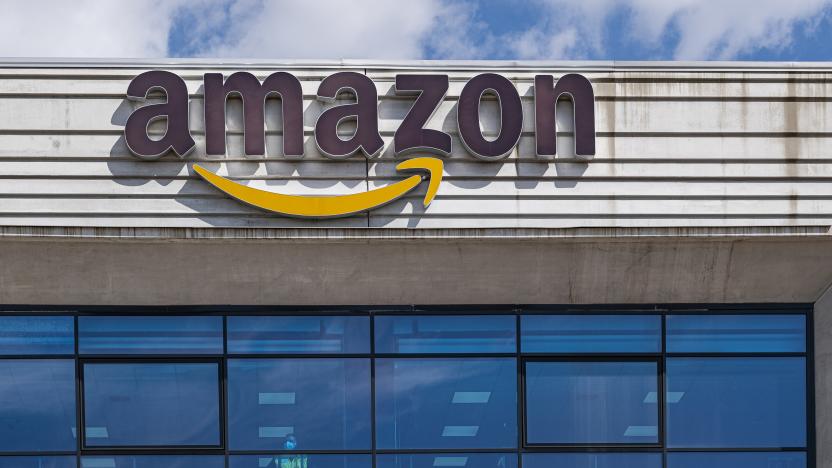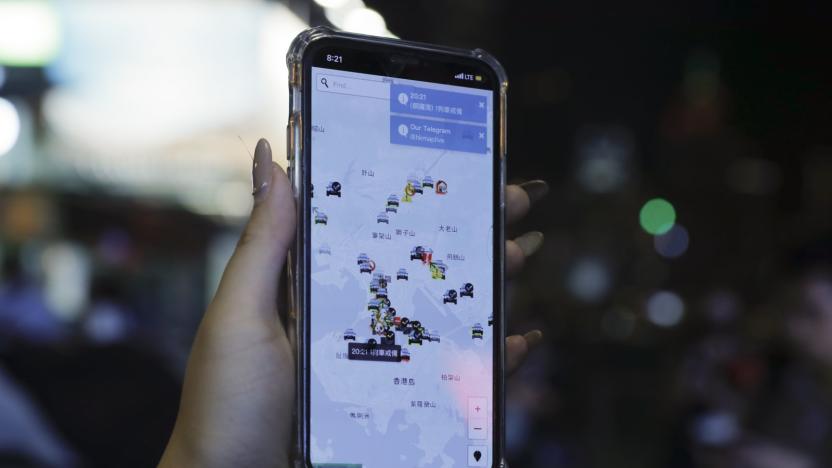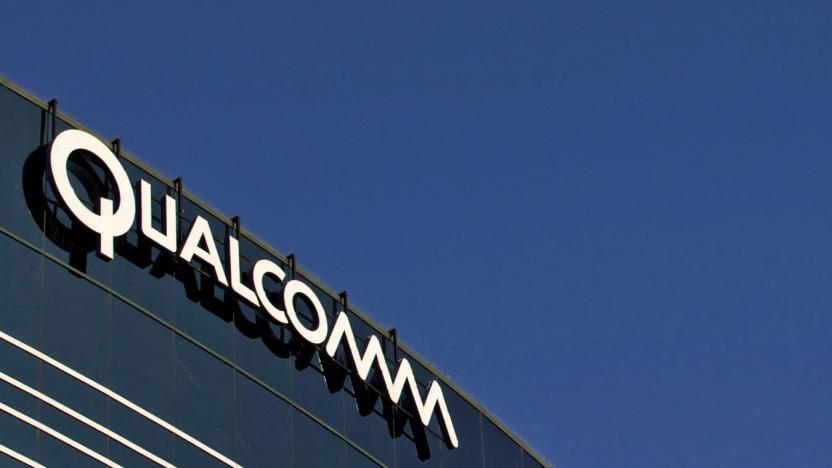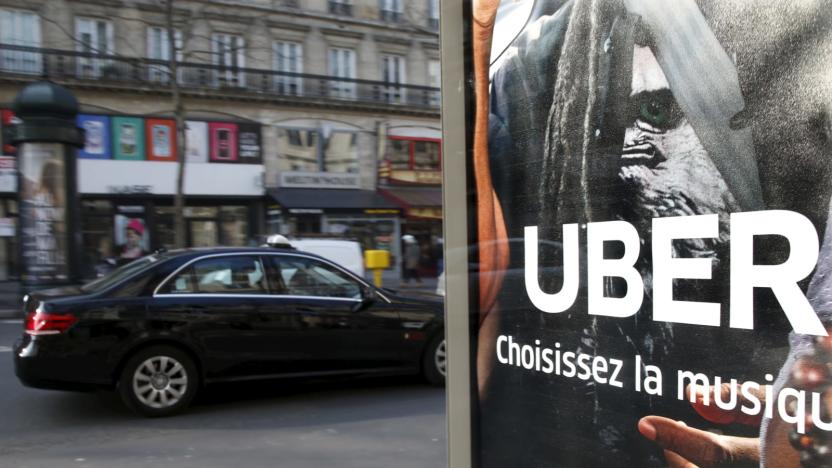decision
Latest

EU court says Amazon won't have to pay its $300 million tax bill
Amazon has won an EU appeal after being hit with a €250 million ($303 million) tax bill by the European Commission in 2017.

Tim Cook defends Apple’s decision to remove Hong Kong protest app
Less than a day after Apple sparked controversy by removing a Hong Kong protest app, CEO Tim Cook has defended the decision. Apple removed the HKmap.live app after China Daily -- owned by the Communist Party of China -- criticized the company for listing it in the App Store. In an internal letter, Cook wrote, "we believe this decision best protects our users."

Federal judge rules Qualcomm violated antitrust rules
Roughly five months after the Federal Trade Commission and Qualcomm entered the courtroom over charges that Qualcomm engaged in anti-competitive behavior, a federal judge has sided with the FTC. In a decision shared Tuesday night, US District Judge Lucy Koh stated that Qualcomm violated antitrust laws, The Wall Street Journal reports. In her decision, Koh said the company charged unreasonably high royalties for its patents and eliminated cell phone chip competitors.

EU decides to treat Uber like a taxi company, not an app
Europe's highest court has ruled that Uber is a transportation company and not some kind of middleman between passengers and drivers, like it has often claimed. The much-anticipated decision opens the door for member nations to impose stricter regulations on the company, especially where it operates the UberPOP service with non-professional drivers.

Beyonce tries to escape Gate Five lawsuit again, fails again
Singer Beyonce has failed, once again, to get herself extricated from the impending lawsuit against her by developer Gate Five Studios. Gate Five claims Beyonce agreed to help make a video game called Superstar: Beyonce late last year, but then backed out of the deal, causing severe financial damage to the studio. Beyonce's lawyers attempted to get a summary judgment in April, claiming Gate Five hadn't pulled in the financing needed to make the game, but that attempt was denied.Now the appeal of that judgment has failed. This doesn't mean Beyonce's lost the case, but it does mean that it'll likely go to trial, where a jury will have to determine if Beyonce was within her contract to leave the project, or if she somehow broke the agreement. The main issue seems to be that Beyonce required a certain amount of financing to stay on board, which she says the studio didn't get. Gate Five has suggested that there was an agreement to get the money Beyonce's contract required very soon, and that she knew that deal was all set to take place.Beyonce, we're really happy for you, and we're going to let this finish and all, but Axel Rose had one of the best video game lawsuits of all time. One of the best video game lawsuits of all time!

German court rules that Motorola, Samsung don't violate Apple touch event patent
Motorola and Samsung just caught a break from the law after a few hard knocks. A Mannheim, Germany court has ruled that neither company infringes on an Apple patent covering how an OS responds to and ignores touch events. While we don't yet know the full details, patent lawsuit guru Florian Mueller suggests that the German judge took the same point of view that thwarted Apple's claims in the Netherlands and the UK: the particular patent was just too broad to stick. It's a potentially important win, as a ruling of violation could have led to serious problems with keeping Android-based Motorola and Samsung devices in stores; other patents are more easily circumvented. However, it's still something of a Pyrrhic victory for a pair of companies that have lately been facing the threat of near-term bans and steep damages.

ITC says Apple didn't violate four Samsung patents with iPad, iPhone
This just hasn't been Samsung's summer. On top of Apple winning its earliest civil lawsuit against Samsung, the International Trade Commission has just handed out an initial determination that Apple didn't violate any of four Samsung patents (including two reportedly standards-essential examples) by offering the iPad and iPhone. While Judge James Gildea didn't publicly outline why Apple was in the clear, he added that Samsung lacks a domestic business that uses the patents -- important when it's trying to claim economic harm in the US. The verdict still gives Samsung at least four months' room to breathe while the ITC reviews the decision, but it's hard to see Samsung enjoying the reduced offensive strength when it's already on the defensive in American courtrooms.

Breakdown of the decisions in Apple versus Samsung verdict
The jury handed down its decision today in the case between Apple and Samsung in the US. It was a big win for Apple and a sweeping loss for Samsung, which will have to pay nearly $1.05 billion in damages assuming its appeals do not change the damages (and assuming the judge does not impose additional penalties for willful infringement). Here is a quick breakdown of the claims and how the jury decided on each. '381 patent This patent describes the bounce-back feature that happens when you scroll beyond the edge of an image or document. The jury found that all of Samsung's devices infringe this patent. '915 patent This patent describes the one finger scroll or two finger pinch to zoom gestures. The jury found that all devices except the Intercept and the Replenish were infringing. '163 patent This patent describes the tap to zoom gesture. The jury found that the Droid Charge, Epic 4G, Exhibit 4G, Fascinate, Galaxy Ace, Galaxy Prevail, Galaxy S 4G, Galaxy S II, Galaxy Tab, Galaxy Tab 10.1, Infuse 4G, Mesmerize and Replenish. The jury found that the Captivate, Continuum, Gem, Indulge , Intercept, Nexus 4G and Vibrant did not infringe. 'D677 patent This patent covers the design of the iPhone. The jury found that the Fascinate, Galaxy S, Galaxy S II, Galaxy S 4G, Epic 4G touch, Skyrocket, Showcase, Infuse 4G, Mesmerize and Vibrant are infringing. The Galaxy Ace did not infringe. 'D087 patent This patent covers the design of the iPhone. The jury found that the Galaxy S, Galaxy S 4G and Vibrant are infringing. The Galaxy S II, Epic 4G Touch, Skyrocket and Infuse 4G are not infringing. 'D305 patent This patent is a trade dress patent for the iPhone's homescreen. The jury found that the Captivate, Continuum, Droid Charge, Epic 4G, Fascinate, Galaxy S, Galaxy S 4G, Showcase, Gem, Indulge, Infuse 4G, Mesmerize and Vibrant are infringing. 'D889 patent This patent relates to the industrial design of a tablet computer. The jury found that none of Samsung's tablet devices are infringing. Samsung patents 914, 711, 893, 460, and 516. The jury found that Apple did not infringe any of Samsung's patents. Sherman antitrust law The jury found Samsung violated Section 2 of the Sherman antitrust law by monopolizing markets related to the UMTS standard, while Apple did not.

Apple v. Samsung jury finds Apple's patents valid, awards it nearly $1.05 billion in damages
The federal court jury in the patent infringement lawsuit between Apple and Samsung has presented its verdict after deliberating for just 21 hours and 37 minutes following the three week trial. This particular case started with Apple's lawsuit last April and now the jury's decision is that Samsung did infringe on Apple's '381 bounceback patent with all 21 of its products in question. For the '915 patent on pinch-and-zoom, the jury ruled all but three of the devices listed infringed, and more damningly, found that Samsung executives either knew or should have known their products infringed on the listed patents. The jury has also found against Samsung when it comes to Apple's contours on the back of the iPhone and its home screen GUI. The Galaxy Tab, was found not to have infringed upon Apple's iPad design patents. The bad news for Samsung continued however, as the jury decided that not only did it willfully infringe on five of the seven Apple patents, but also upheld their validity when it came to utility, design and trade dress. The amount of the damages against Samsung is in: $1,051,855,000.00 (see below). That's less than half of the $2.5 billion it was seeking, but still more than enough to put an exclamation point on this victory for the team from Cupertino. The final number is $1,049,343,540, after the judge found an issue with how the jury applied damages for the Galaxy Tab 10.1 4G LTE and Intercept. The jury also ruled that Apple did not infringe upon Samsung's patents with the iPhone 3G and 3GS, and has awarded it zero dollars in damage. We'll have more information for you as it become available. Update: Both companies have released statements on the matter, with Apple stating via the New York Times the ruling sends a loud and clear message that "stealing isn't right." Samsung has its own viewpoint calling this "a loss for the American consumer" that will lead to fewer choices, less innovation and high prices. You can see both in their entirety after the break.

ITC decides Apple didn't violate Motorola WiFi patent after all, tosses case back to judge
Trouble looked to be brewing for Apple last April: an International Trade Commission judge made an initial ruling that Apple infringed on a standards-essential Motorola WiFi patent, raising the possibility of a trade ban if the verdict held true. The fellows in Cupertino may have caught a big break. A Commission review of the decision on Friday determined that Apple didn't violate the patent, and it upheld positions that exonerated the iPhone maker regarding two others. Apple isn't entirely off the hook, however. The ITC is remanding the case to the judge to review his stance that Apple hadn't violated a non-standards-based patent, which still leaves Apple facing the prospect of a ban. However, having to revisit the case nearly resets the clock -- we now have to wait for another ruling and a matching review, and that likely puts any final decision well into 2013. Google-owned Motorola isn't lacking more weapons in its arsenal, but any stalled proceedings take away bargaining chips in what's become a high-stakes game.

Judge cuts international Galaxy S and S II, Galaxy Ace from Apple lawsuit against Samsung
Apple rested its side of the case in its main lawsuit against Samsung on Monday, and with the switch of focus came a small sacrifice. While Samsung failed in a Hail Mary bid to have the suit dismissed, it successfully argued that a few devices should escape the clutches of a full-fledged ban. Don't get too excited, though: the exclusion list mostly touches on phones that only reach US shores through unofficial importers, including the Galaxy Ace as well as international editions of the Galaxy S and Galaxy S II. The decision still leaves the American variants of phones under scrutiny, and it doesn't change Apple's hopes of a large licensing fee for all the alleged transgressions. We'd still say the exemption provides some small amount of relief for Samsung, however. Most of Apple's early, less-than-flattering accusations of trade dress violations focused on the more familiar-looking foreign Galaxy models and lose some of their thunder when leveled against the conspicuously altered designs that eventually set foot in the US.

Apple wins stay on having to post 'Samsung did not copy' notice
Apple's pride can stay intact for at least a little while longer: the company successfully won a stay on a UK ruling that would have it post notices clearing Samsung's name in the wake of the two tech giants' patent dispute in the country. Apple now won't have to face any kind of public flogging unless it loses an appeal on the non-infringement verdict, which is due to be heard in October. Not surprisingly, the iPad creator doesn't want its own site to become a billboard promoting someone else's work. The decision makes Samsung's victory that much more bittersweet -- along with losing that instant satisfaction from a humbled Apple, it still has to accept a verdict that claims the Galaxy Tab supposedly isn't cool enough to have been an imitation.

Encrypted Text: Examining the tempo of our rotations
Every week, WoW Insider brings you Encrypted Text for assassination, combat and subtlety rogues. Chase Christian will be your guide to the world of shadows every Wednesday. Feel free to email me with any questions or article suggestions you'd like to see covered here. In StarCraft, my favorite RTS, there's a common term known as APM. APM stands for actions per minute, which refers to how many commands a player is able to enter per minute. If you have fast fingers and you're incredibly skilled, your APM can soar into the hundreds with your flurry of multiple commands per second. If you're an average player, you will probably stay under 100 APM for the majority of each game. APM isn't a direct indicator of player skill but rather a measurement to describe the way the player is interacting with the game via a keyboard and mouse. The tempo of our rogue rotations is a topic that I love exploring. Subtlety feels fast to players, while assassination rogues often complain that their rotation is slow. By applying the concept APM and a few other input metrics, we can try to quantify exactly what makes a rotation seem fast or slow. Rogue rotations are constantly evolving between expansions and even as we acquire gear, and math can help us examine the net effect of these changes.

German court rules Motorola Xoom doesn't violate Apple's iPad design patent
Apple filed a stealth lawsuit last summer alleging that the Motorola Xoom violated the design patent that underpins the iPad. While Apple has had some success leveling its big patent gun against Samsung, the same can't be said for Motorola: a German court just declared that the reference Android tablet doesn't infringe on Apple's design claim. The ruling isn't a complete win for Motorola, however, as the court wouldn't invalidate the patent -- it could theoretically be leveled against other tablets in the future. The loss will still sting for Apple, which now has to resort to a multi-touch patent claim (among others) if it wants to make Motorola feel the heat in Mannheim.

EU clears resales of used software, shoots down Oracle's new-sales-only dreams
One advantage American technology fans can celebrate is the right to resell software. After the initial purchase, they're usually cleared to pass along any apps or games as long as the technology itself allows. Europeans haven't had that (legal) option to date, but the EU's Court of Justice has just ruled in a case against Oracle that they will going forward: no matter what the license says, those in EU countries can resell their downloaded apps as long as they don't try to keep a working copy for themselves. The new owner doesn't even have to shuffle over a local example and can go straight to the source. We can't imagine that Oracle and other companies averse to used software are jumping for joy, although copy protection and a lack of digital resale mechanisms might help them simmer down and let us treat our apps like we do our gadgets. [Image credit: Maciej Bliziński, Flickr]

Microsoft catches a break: ITC remands Motorola case, Xbox 360 dodges at least a 2012 ban
Things were looking grim for gaming in April, when the International Trade Commission decided that the Xbox 360 violated Motorola patents and the console's US future was in doubt. The agency hasn't necessarily reversed its decision, but it just gave Microsoft a significant (and possibly permanent) reprieve. The Commission has remanded Motorola's case back to the Administrative Law Judge that gave the initial ruling, which very nearly restarts the clock: a new ruling won't come for months, and the usual review process guarantees even more of a delay even if the decision once more works in Motorola's favor. Patent suit watcher Florian Mueller is now confident that the Xbox 360 won't face any real risk of a ban in 2012, at a minimum. If the new decision doesn't clear Microsoft outright, it still pushes any ruling past a Microsoft lawsuit's trial in mid-November, when Motorola might be blocked from attempting any ban using its standards-based patents. We've rarely seen a majority or total reversal of this kind of ITC patent dispute before it reaches the appeals stage, but there's a distinct chance of that flip happening here -- especially as the ITC is using Apple's successful dismissal of an S3 Graphics victory as the judge's new template.

Kodak can't dismiss Apple's claims on patents, gets clearance to sell those patents regardless
Apple might have been denied a lawsuit against Kodak while the former camera maker is in bankruptcy, but that hasn't kept it from winning in court. A Manhattan judge has tossed a Kodak attempt to dismiss Apple's claims that it, not Kodak, owns 10 of those patents through collaborative work back in the QuickTake days. The ruling explicitly clears Kodak to sell the patents to the highest bidder and gives it a quicker path to recovery. However, the compromise also sends a warning to any potential buyers that Apple might have a stake in patents that change hands -- a decision that will either push Kodak to set some money aside or risk sticking a potential buyer with the bill. While who owns what is still up for debate, Kodak likely isn't eager to have another Sword of Damocles over its head that risks scaring away much-needed patent buyers. [Image credit: Pittaya Sroilong, Flickr]

French court rules Google isn't liable for YouTube bootlegs of TF1 TV shows
France typically hasn't been kind to Google. Today, though, it's cutting some important slack. A court has ruled that the search firm can't be held liable when YouTube members upload clips of their favorite football matches or movies from local network TF1. As in a case involving Dailymotion last year, the judge saw YouTube as just the host for others' videos rather than having any hand in producing the content itself. Not only does the decision let Google off the hook for a possible €141 million ($177 million) fine, it prevents the company from having to pre-screen every video that might be visible in France -- a difficult challenge for a company that takes 72 hours of new video every minute. Google is still facing less-than-cordial attitudes towards its copyright enforcement in other countries, including a zombie Viacom lawsuit in the US, but it now has some extra ammunition if it wants to cite a precedent. [Image credit: Premiere]

Australian court holds Google responsible for misleading search ads
In a turnaround from a lower court ruling, three Australian Federal Court judges ruled yesterday that Google was responsible for its advertisers' content and that it breached the country's trade law by hosting misleading ads. The case centered on four ads in particular, in which the advertisers used the names of their competitors to ensure the ads appeared in search results for said companies. That, the court ruled, was likely to mislead folks searching for those competitors. While there's no fine imposed on Google with that judgement, the judges are asking Google to change its practices and to pay court costs. The ruling also, of course, sets quite a precedent if it is upheld. Not surprisingly, Google disagrees with the judges' decision, noting that it believes "advertisers should be responsible for the ads they create on the AdWords platform," and that it's now considering its options (including an appeal to the High Court).

German appeals court lets Motorola to continue push notification patent against Apple
Germany has been the site of quite a few patent battles between Motorola and Apple in the past, and there's another crater on the landscape over there: One of the High Regional Courts in that country has made a decision on Motorola's ongoing challenge against Apple over push notifications, saying that a motion by Apple to try and suspend an injunction by Motorola attempting to keep Cupertino from using iCloud over there has been denied. In other words, Motorola is free to continue its battle to try and prevent Apple from using push notifications. Not great news for Apple, and not bad news for Motorola. Motorola is obviously trying to keep Apple from using iCloud and push notifications in Germany, claiming that it already owns the patent on that technology. FOSS Patents has a more complete rundown of what's going on if you're tracking the legal maneuvers.






